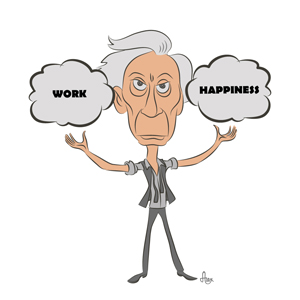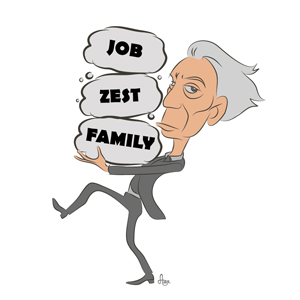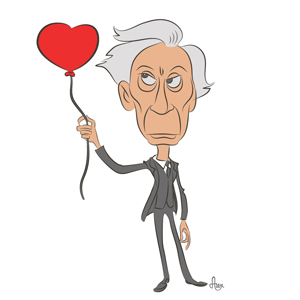
Your complimentary articles
You’ve read one of your four complimentary articles for this month.
You can read four articles free per month. To have complete access to the thousands of philosophy articles on this site, please
Bertrand Russell
“To be happy, one must first not be unhappy”
Tim Delaney finds joy in Bertrand Russell’s The Conquest of Happiness.
In 1930, Bertrand Russell published The Conquest of Happiness, a book that predates the contemporary fascination with self-help publications by decades. It was described by Russell in the Preface as “not addressed to highbrows, or to those who regard a practical problem merely as something to be talked about” (p.ix). Russell’s use of the word ‘conquest’ in the title emphasizes his primary contention that, except in rare cases, happiness does not simply present itself to people, but rather must be achieved. He argues that the multitudes of men and women who suffer from unhappiness could achieve happiness if they heed the advice he offers in the book.
Unhappiness

Russell spends more time in Conquest discussing the causes of unhappiness than he does the causes of happiness. He acknowledges that some of the many causes of unhappiness have their root in the social system, and others are the result of one’s own psychology. For Russell the social system creates war, economic exploitation, and unequal access to high-quality education, and employs fear tactics to disorientate people about their place in society. Elaborating on war, Russell states that social systems cannot avoid war when “men are so unhappy that mutual extermination seems to them less dreadful than continued endurance of the light of day” (p.15).
Addressing the issue of individual psychology, Russell states that here unhappiness is caused largely by “mistaken views of the world, mistaken ethics, mistaken habits of life, leading to destruction of that natural zest and appetite for possible things upon which all happiness, whether of men or animals, ultimately depends. These matters lie within the power of the individual, and I propose to suggest the change by which his happiness, given average good fortune, may be achieved” (p.16).
To that end, in Chapter 2 Russell describes ‘Byronic’ unhappiness. The concept of Byronic unhappiness harks back to the characteristics and poetry of the English Romantic poet Lord Byron, especially his romanticism, melancholy, and melodramatic energy. Essentially, the Byronic individual has a self-absorbed, brooding personality: the term may further describe a proud, moody, cynical, defiant and lonely person.
Russell depicts Byronic individuals as truly unhappy, but also “proud of their unhappiness, which they attribute to the nature of the universe and consider to be the only rational attitude for an enlightened man” (p.25). Russell however counters that there is no superior rationality in being unhappy, and the wise individual should allow himself to be happy as circumstances permit. And unless you are Byronic, you will try to avoid being around those who are ‘happy with being unhappy’, since their negative attitudes may rub off on you.
Russell believes that the greatest threat to happiness is competition. He speaks of people who work so much that they ignore the simpler things in life that can bring happiness. Boredom is another source of unhappiness he discusses. He thinks that boredom is an exclusively human emotion. Animals may become listless, pace up and down, and yawn; but what they experience is not boredom.
According to Russell, the opposite of boredom is excitement. Thus, if we are not excited by our environment or circumstances, we are bored by them. He writes, “The desire for excitement is very deep-seated in human beings, especially in males. I suppose that in the hunting stage it was more easily gratified than it has been since” (p.57).
Fatigue also contributes to unhappiness. Russell says fatigue can be a ‘grave evil’. In common with modern views, Russell also links stress and anxiety to fatigue. As a piece of great advice, he says that a great many worries could be diminished by realizing the unimportance of whatever is causing the anxiety. Thus, a key to happiness is not caring about what others think of you or what others think is important. (This makes me think of a sign I once read on the wall of a mechanic’s garage: “An emergency on your part does not make it an emergency on my part!”)
Russell then states, “Next to worry, probably one of the most potent causes of unhappiness is envy. Envy is, I should say, one of the most universal and deep-seated of human passions” (p.82). As Russell alludes, if we compare ourselves only to people who have achieved or have more than we have, we are likely to be unhappy.
In Chapter 7, Russell describes ‘the sense of sin’ as one of the most important psychological causes of unhappiness due to the corresponding feeling of unease. Remorse takes residence within one’s consciousness through reflection upon an act that violates one’s own code of conduct. As Russell writes, “Nothing so much diminishes not only happiness but efficiency as a personality divided against itself” (p.107). Remorse is also likely to make one feel inferior. Worse yet, the unhappy person is likely to act out in a number of harmful ways, including setting unrealistic expectations on others’ behaviors, or holding grudges against those who seem superior.
The last two sources of unhappiness described by Russell are persecution mania, where people envision that others wish to kill, imprison, or otherwise injury them, and a fear of public speaking. Of the fear of public speaking, Russell states, “Very few people can be happy unless on the whole their way of life and their outlook on the world is approved by those with whom they have social relations, and more especially, by those with whom they live” (p.126).
Happiness

Russell’s description of the causes, or more accurately the sources, of happiness begins with zest. He equates zest with a thirst for life. Among the examples he provides to illustrate the concept, is the idea that while many people eat their daily meals as a chore to be completed, others approach the preparation and consumption of a meal with gusto. As a bachelor who eats most of his meals alone, I see a meal as something that is nuked in a microwave, and find relatively little pleasure from the experience. On other occasions, however, when preparing a meal for companions or going out to dinner with friends, especially where a favorite meal is about to be served, dining takes on an entirely new meaning. It adds zest to my life.
Russell points out that the more things a person is interested in, the greater the opportunities for zest, and so, happiness. He especially promotes the value of affection, both toward and from others. As he explains, “One of the chief causes of lack of zest is the feeling that one is unloved, whereas conversely the feeling of being loved promotes zest more than anything else does” (p.176). Moreover, those who face life with a feeling of security are much happier than those who face it with a feeling of insecurity. “It is affection received, not affection given, that causes this sense of security,” Russell writes, “though it arises most of all from affection which is reciprocal” (p.178).
A solid and rewarding family life is another great source of happiness. As sociologists oft explain, the family serves as a primary agent of socialization, and plays a hugely significant role in personal security, affection and happiness.
Russell further points out that having work is not only a mark of being a productive member of society, it can bring a great sense of happiness. He states that “provided work is not excessive in amount, even the dullest work is to most people less painful than idleness” (p.209). And certainly, almost anyone who has been, or is currently, unemployed, can attest to the unhappiness that unemployment can bring. Work, therefore, is desirable and provides us with many opportunities for happiness.
Another source of happiness is the pursuit of impersonal interests. Impersonal interests are those pursuits which help to fill one’s leisure time and afford relaxations from the tenseness of the more serious preoccupations of family, work and finances. Reading a book, watching games, going to the theatre, and playing golf are among examples that Russell provides here.
The key to Russell’s view of happiness resides in the idea that except in very rare cases, happiness is not something that simply happens ; rather, it is something that must be achieved through effort – conquered. This makes me think of the saying that good things do not come to those who wait. Instead, they come to people who actively seek happiness and strive to conquer the obstacles that come between their pursuit of happiness and happiness itself.

Perhaps surprisingly, resignation also has a part to play in the conquest of happiness, and this part is no less essential than that played by effort. Thus Russell argues that a wise person will learn to resign from the pursuit of desired but unattainable forms of happiness, so as not to interfere with pursuing the attainable forms. He says, for example, “Nothing is more fatiguing, nor, in the long run, more exasperating, than the daily effort to believe things which daily become more incredible. To be done with this effort is an indispensable condition of secure and lasting happiness” (p.241).
So Russell recognizes that happiness depends partly upon external circumstances and partly upon oneself. Some people are born with certain advantages; and yet we all, potentially, have the possibility of attaining happiness. The happy person is someone who has affections, wide interests, pursues life with zest, is free from suffering, is a citizen of the universe, and doesn’t give a damn either about what others think of them or what others think is important.
© Dr Tim Delaney 2017
Tim Delaney is a professor and the department chair of Sociology at the State University of New York in Oswego. He has published nineteen books: please visit his website BooksByTimDelaney.com.
• This article contains excerpts from Friendship and Happiness and the Connection Between the Two by Tim Delaney and Tim Madigan (McFarland 2017).









